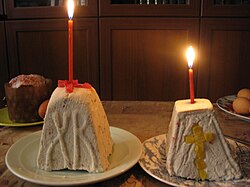Easter travel
Easter is together with Christmas the most important holiday in Christianity. As such Easter features special events and foods around the world, and many travel to see friends and family.
Understand
[edit]According to Christian tradition, Jesus was crucified, died and was resurrected from the dead on the third day. This is celebrated as Easter. It is celebrated near the next full moon after the March equinox, but as the date of the full moon is calculated according to old algorithms that differ between churches, the Orthodox Easter does not always coincide with the Easter in Western countries. Passover (Pesach), a Jewish festivity commemorating the Exodus from Egypt is celebrated during a similar time and the two festivals are linked through the biblical account which says Jesus was in Jerusalem to celebrate Passover when the events of the passion story were set into motion. Along with the high holidays in September/October, Passover is another opportunity for many Jews to visit Israel or friends and family there, meaning Easter in the Holy Land can get particularly crowded when the dates align.
Easter is probably the most visible Christian festivity of the year, with services, sacral music, parades, reenactments and closed venues in many parts of the world, even in some countries with few regular church-goers. People who visit the church only a few times early, might still regularly attend some of the Easter services. On the other hand, for many people, Easter is more about the Easter Bunny (or the Easter bilby in Australia), egg hunts and similar not-so-religious events than about Christ's death and resurrection.
The events of the Holy Week are among the most prevalent motifs in European art, with a crucifix as the altarpiece of virtually every church. There are also several grand music pieces, passions, set to the biblical texts about the event. These may be performed in church concerts during the Holy Week.
In much of Latin America "semana santa" ("holy week") is among the busiest travel periods of the year and as many people don't have to work, public life and transportation may grind to a halt for a few days. Naturally hotels, beaches and so on get crowded and even in places where pre-booking is usually not necessary it may become necessary during that time of year. On the other hand, bargains may be had for flights out of Latin America during that time, much like going in the reverse of peak travel direction during Hajj in Saudi Arabia.
In the Philippines, some Christian sects celebrate Good Friday by crucifying their men in order to remind themselves of the suffering Jesus went through on the cross.
Some ski resorts in the northern hemisphere have their peak season at Easter. However, with Easter sometimes being in mid April and climate change increasingly challenging "snow security", you should do research in advance to minimize the risk of "green Easter" when you wanted to go skiing.
See
[edit]
- Different Easter parades
- The Pope's Urbi et Orbi address and blessing on Saint Peter's Square in the Vatican.
- Reenactments of the last days of Jesus, for example in Jerusalem where they actually took place. Or a more violent variant in the Philippines where volunteers are crucified for real (for a few minutes).
Do
[edit]- Go to church for mass or concert
- Paint Easter eggs
- Hunt for Easter eggs (especially kids)
- Go watch an Easter bonfire
Buy
[edit]Eat
[edit]
Some foods are associated with Easter in the different parts of the world:
- eggs and egg based foods
- chocolate (shaped like eggs or bunnies)
- different Easter cakes and Easter breads:
- hot cross buns, a lightly spiced sweet bread roll with fruit, with a pastry cross on top.
- Simnel cake, a light fruitcake with almond paste or marzipan layers
- lamb dishes
- mämmi, a traditional Finnish dessert, made of rye and Seville orange zest.
- paskha, a pyramid shaped Slavic festive dish, made from a Slavic festive dish made from quark (curd cheese).
- fish and other seafood on Good Friday
Drink
[edit]Sleep
[edit]There's a tradition to pass the Easter night awake at some exposed point to see the sunrise. There are of course Christian theological explanations for this tradition, but it may well be a pre-Christian Spring and Fertility ritual. More traditional churches often hold an Easter Vigil on Saturday night during the Easter weekend, with the congregations often breaking into celebration at the stroke of midnight to celebrate Christ's resurrection.


 Français
Français Italiano
Italiano



